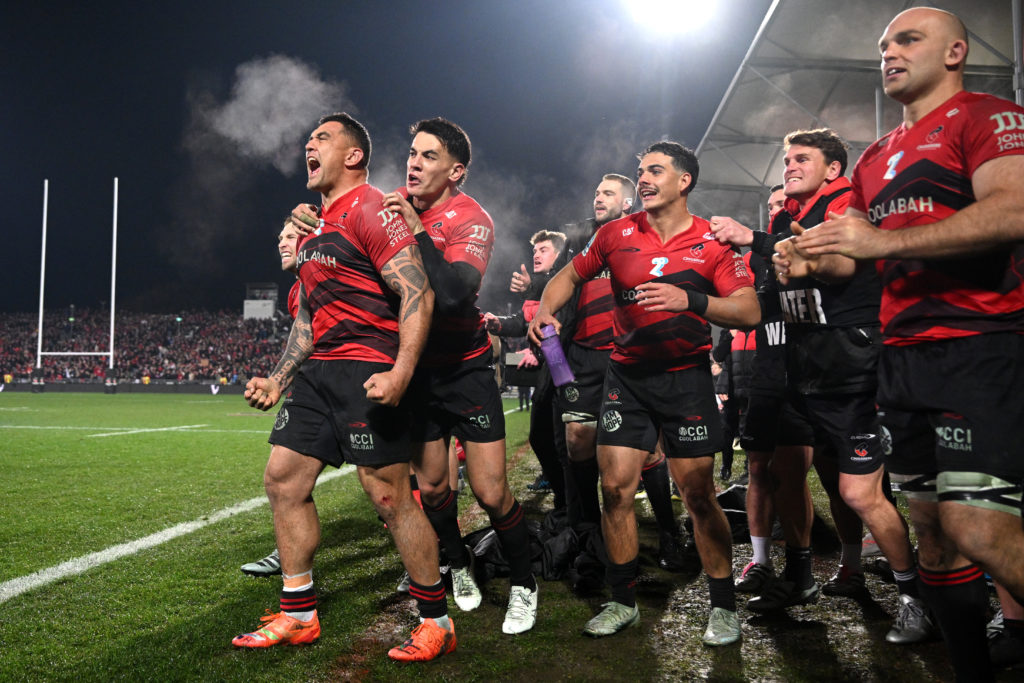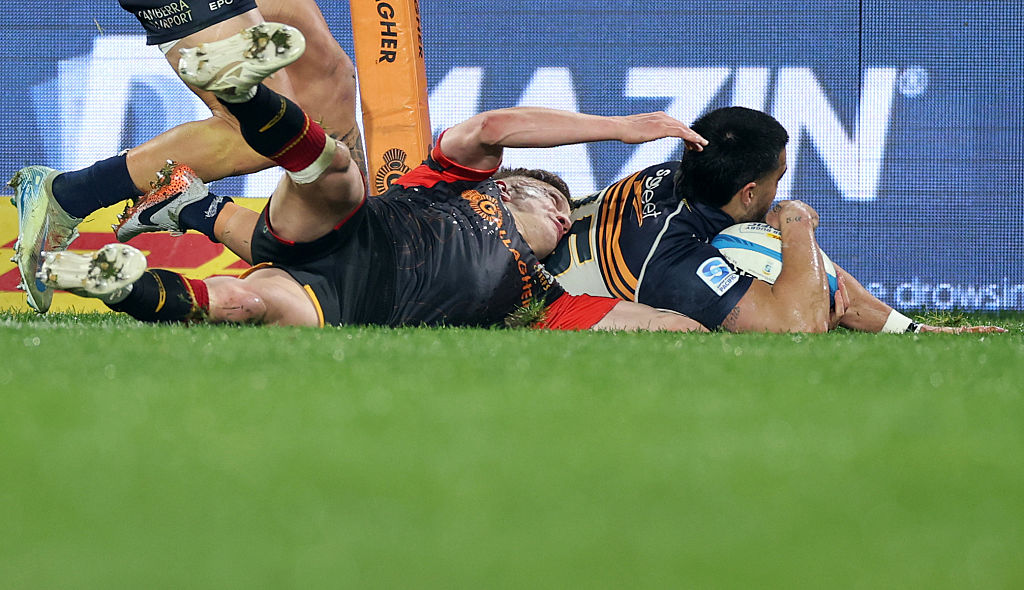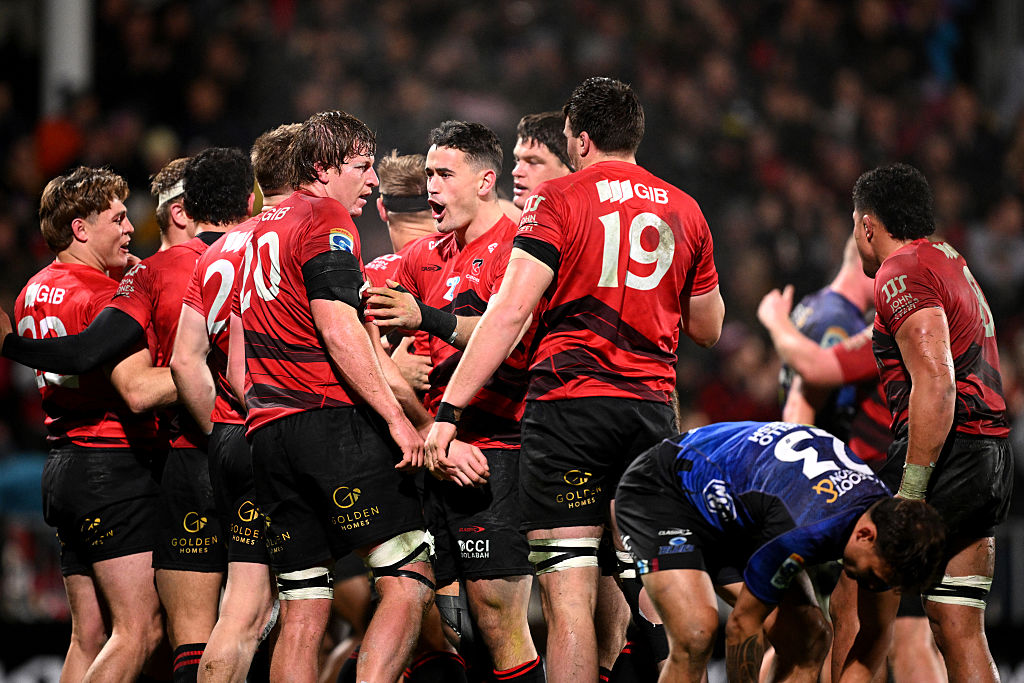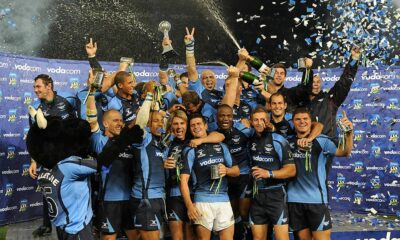Super Rugby
Highlanders grind down Reds, Chiefs hold off Waratahs
The Highlanders were indebted to a late Lima Sopoaga penalty as they came away from Brisbane with an 18-15 win over the Reds in Super Rugby.
Lima Sopoaga’s penalty with two minutes remaining earned the Highlanders a hard-fought 18-15 success at the Reds in Super Rugby on Saturday.
Sitting fourth in a strong New Zealand Conference, the Highlanders are a point behind the Chiefs, who overcame Australian Conference leaders the Waratahs 39-27 earlier in the day.
Sopoaga started and finished the scoring at Suncorp Stadium, slotting an early penalty to give the visitors the lead, which was cancelled out by Jono Lance midway through the half.
Tevita Li claimed the opening try of the game, receiving the ball from the base of the scrum and, with numbers piled to the right, he darted left and outstripped his marker to score in the corner.
Brandon Paenga-Amosa went over for the Reds, who, thanks to Lance’s conversion, led 10-8 at the break – an advantage that was extended by Hamish Stewart’s score within five minutes of the resumption.
But Liam Squire barged over with just under an hour played and the score was converted by Sopoaga, who kept his cool in the closing moments to hand his side the points.
FULL TIME | HIG 18 – RED 15. It’s all over here in Brisbane, #YOURLanders take the win! It was a tight match but the @Highlanders close it out. #HIGvRED #HighlandersANDyou pic.twitter.com/xnCuOKqa88
— Pulse Energy Highlanders (@Highlanders) May 26, 2018
At Waikato Stadium, the Tahs took a 14-0 lead inside the opening quarter of an hour through Cam Clark and Curtis Rona, but trailed at the half after Brodie Retallick, Nathan Harris and Damian McKenzie crossed the tryline.
Toni Pulu claimed a brace after the interval, either side of Kurtley Beale’s score for the Waratahs, who reduced the gap to just two points through Bernard Foley’s penalty with around 15 minutes remaining.
McKenzie slotted over from the tee to give the Chiefs a measure of breathing space, before converting his own try once the clock had gone red to secure a bonus point and give the scoreline a perhaps undeservedly flattering look.
KEO.co.za News wire is powered by opta
KEO News Wire
Rassie Erasmus talks Springboks & the road to 2027 World Cup
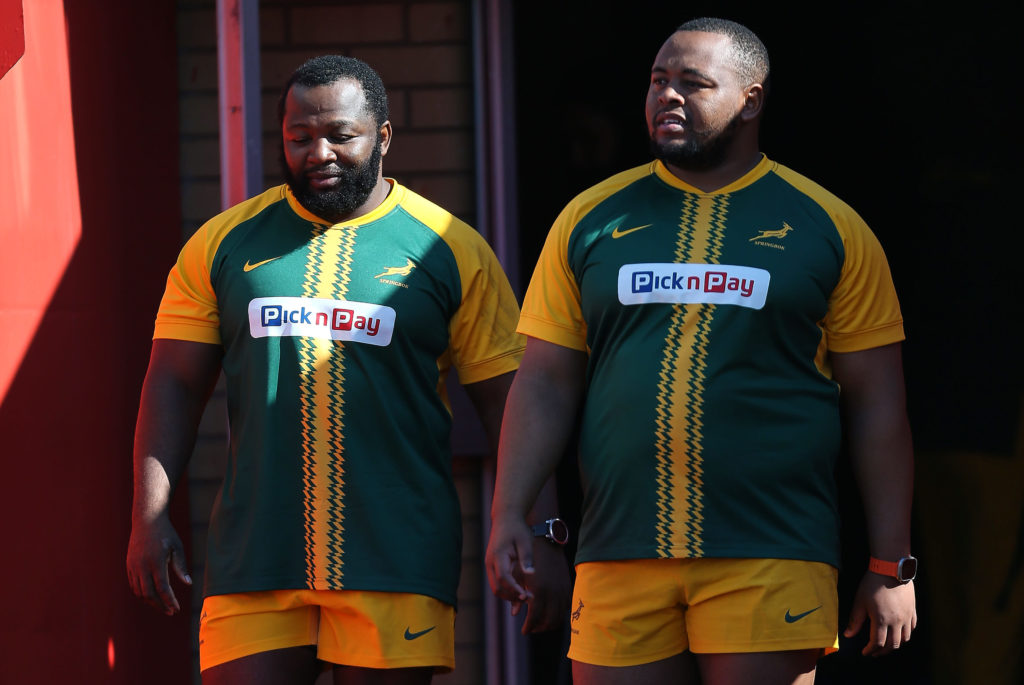
Rassie Erasmus talks Springboks & the road to 2027 World Cup as his squad prepares for the first challenge of 2025 in the Barbarians FC in Cape Town on Saturday.
Erasmus spoke with SPORTSBOOM
In the interview the Springboks coach spoke of the significance of 2025 when he would identify the core of his 2027 World Cup squad.
The back-to-back World Cup winner will always recognise an extraordinary case for selection close to 2027 but historically he has always settled on the majority of his squad two years out from the World Cup.
Erasmus has never been conservative with his selections and while he has consistently said the best player is not necessarily the right player for his squad environment, the ideal selection is when the best players are the right players.
Erasmus has a huge regard for the potential of Lions prop Asenathi Ntlabakanye, whose 148kg frame is the most recognisable of all in the Vodacom United Rugby Championship.
The big prop is also among the most popular characters in the competition.
Erasmus spoke of Ntlabakanye’s work rate and soft skills, and how he will be integrated into the Boks system in the next few months.
“It’s like when people say certain players are too small, Cheslin Kolbe and Kurt-Lee Arendse for example. But they have done very well at the highest level. I look at the actions of the player, not what he looks like. Asenathi [Ntlabakanye] makes more tackles than most tightheads, he scrums very well, he carries hard, and he has good hands. He shows that you can’t judge a book by its cover, and he works very hard. He has made massive progress since he has been with us,” Erasmus told SPORTSBOOM
Erasmus has picked a handful of uncapped players in his squad of 45 for the non-international against the Barbarian FC on Saturday, the two-Test series in South Africa against Italy and the one-off Test against Georgia.
He will review the squad and trim it for the Rugby Championship, which includes two home Tests against the Wallabies and two away Tests against the All Blacks.
“We’re not really concentrating on the World Cup yet two years out, although in 2018 I was already building for 2023. This year is about identifying players who can win you World Cups and seeing how many opportunities you can give them to play. I want to look at them through that Test match lens. It’s very difficult to judge players at their clubs, because you don’t know what they are being coached to do, how that team wants them to play. And I don’t want to give someone one or two Test caps; I would love it if everyone can get eight caps or more. Our average age should be around 28/29 going into the next World Cup,” said Erasmus. ‘But winning is important, especially since at the end of this year they will make the draw for the World Cup. We also want people to get behind us and support us. So, a solid start to the year is important.”
In discussing the Barbarian FC match, Erasmus said it would be a mixture of old and new, but that the approach would be in keeping with their approach to Test matches.
“The BaaBaas match is a bit slippery because usually we love to analyse our opposition, find out where their strengths and weaknesses are, but obviously we can’t do that with the Barbarians. For them you have to analyse individuals, and they also announce their final team very late. So, the message to the players will be to play what you see in front of you and enjoy yourself. Hopefully, we can get through that game without any mental scarring.”
The Boks and Barbarians drew 31-all the last time the two teams played and it has been 25 years since the Boks beat the Barbarians, having won three, drawn one and lost four of their eight encounters.
SOUTH AFRICA’S MOST CELEBRATED BARBARIANS
KEO News Wire
The Crusaders scalp Chiefs to win Super Rugby Pacific
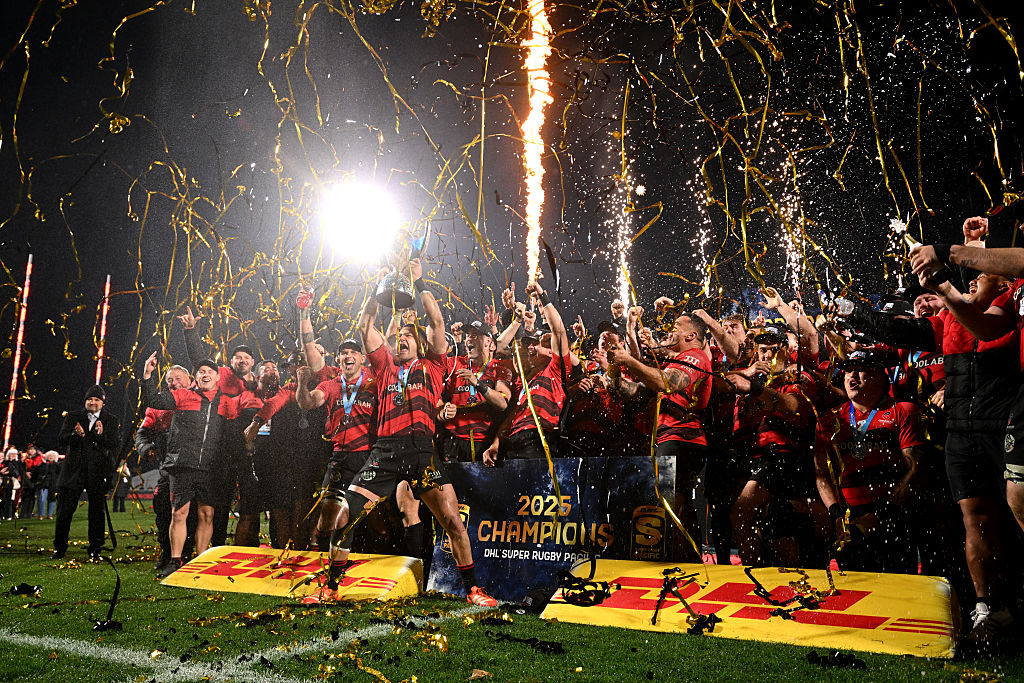
The champion Crusaders played the game in the right areas, retained ruck possession for a 99 percent return, and produced a Finals’ performance as physically bruising as it was intellectually imposing in beating the Chiefs in the Super Rugby Pacific Final in Christchurch, writes Mark Keohane.
My Sunday Times rugby column – KEO UNCUT – is dedicated the Crusaders 13th Super Rugby title since Super Rugby started in 1996. It makes them the most successful club team in the competition and in any international club rugby competition.
The Chiefs, the in-form team in the league, lost for the third successive time in the final of Super Rugby Pacific.
In my Sunday Times column I single out the brilliance of Crusaders and All Blacks fullback Will Jordan under the high ball, All Blacks captain Scott Barrett’s performance, Crusaders captain and All Blacks utility back David Havili’s influence and the explosiveness of All Blacks hooker Codie Taylor.
This season I have often written that the All Blacks will be back to what we knew them to be pre-Covid and that Super Rugby Pacific is the real deal.
My Sunday Times column was another reminder, statement and caution to the Springboks to know what awaits them at Eden Park in Auckland on the 6th September. It is going to be colossal if the intensity and mongrel of the 2025 Super Rugby Pacific Final is the measurement.
BE WARNED SOUTH AFRICA, SUPER RUGBY PACIFIC IS PROPER
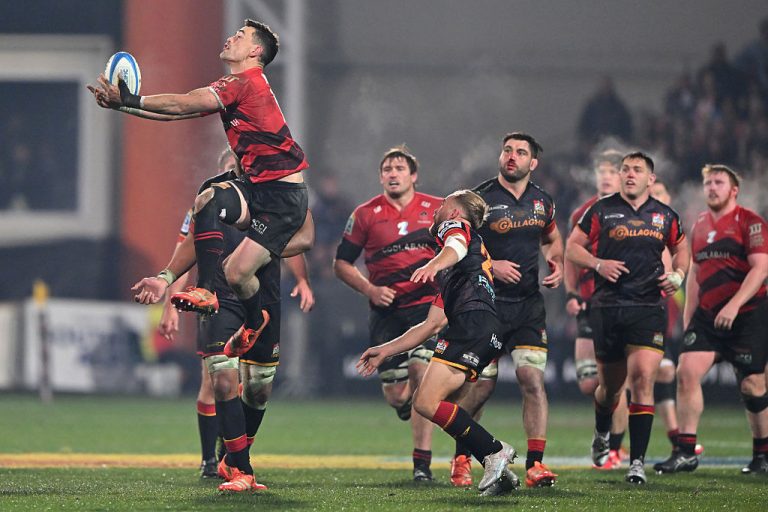
Photo: Kai Schwoerer/Getty Images
How Stuff.co.nz described the win: They did it on the back of everything they’re renowned for – defence, set piece and the ability to own the moments that matter most. Will Jordan’s aerial prowess was especially crucial in closing out the match, which featured just a lone Crusaders penalty goal in the second half, and was packed with close shaves, stone wall defence, and nerve-jangling moments to keep punters on their edge of their seats.
How NZHERALD described the win: Rumours of the Crusaders’ demise have been greatly exaggerated.The old adage is that defence wins championships, and both sides were forced to muscle up well inside their own half to keep the opposition out. If there was one area that really separated the sides, it was in the aerial attack of the Crusaders. Their kicks where chased with intent, and were weighted well enough that the chasers could get to them to either contest or put pressure on the Chiefs player who came down with the ball.It took 31 minutes of the second half before the scoreboard ticked over again. Both teams had terrific chances throughout the second half, but again, the championship defences stood strong on both sides. Another scrum penalty – Fletcher Newell 71 minutes into his shift getting the pats on the back – saw Reihana add another three points, which pushed the lead out to four with less than 10 minutes to play.That was where the scoring ended.
KEO CALLED THE CRUSADERS WIN AND A 13th TITLE.
At Apollo Projects Stadium, Christchurch: Crusaders 16 (Codie Taylor try 25min; Rivez Reihana con, 3 pen) Chiefs 12 (George Dyer try 13min, Shaun Stevenson try 38min; Damian McKenzie con). HT: 13-12
Yellow card: David Havili (Crusaders).
Crusaders: Will Jordan, Sevu Reece, Braydon Ennor, David Havili (capt), Macca Springer, Rivez Reihana, Noah Hotham, Christian Lio-Willie, Tom Christie, Ethan Blackadder, Antonio Shalfoon, Scott Barrett, Fletcher Newell, Codie Taylor, Tamaiti Williams. Reserves: George Bell, George Bower, Seb Calder, Jamie Hannah, Cullen Grace, Kyle Preston, James O’Connor, Dallas McLeod.
Chiefs: Shaun Stevenson, Emoni Narawa, Daniel Rona, Quinn Tupaea, Leroy Carter, Damian McKenzie, Cortez Ratima, Wallace Sititi, Luke Jacobson (capt), Samipeni Finau, Tupou Vaa’i, Naitoa Ah Kuoi, George Dyer, Samisoni Taukei’aho, Ollie Norris. Reserves: Brodie McAlister, Aidan Ross, Reuben O’Neill, Jimmy Tupou, Kaylum Boshier, Xavier Roe, Josh Jacomb, Etene Nanai-Seturo.
KEO News Wire
Super Rugby Pacific names its first ever TEAM of the YEAR
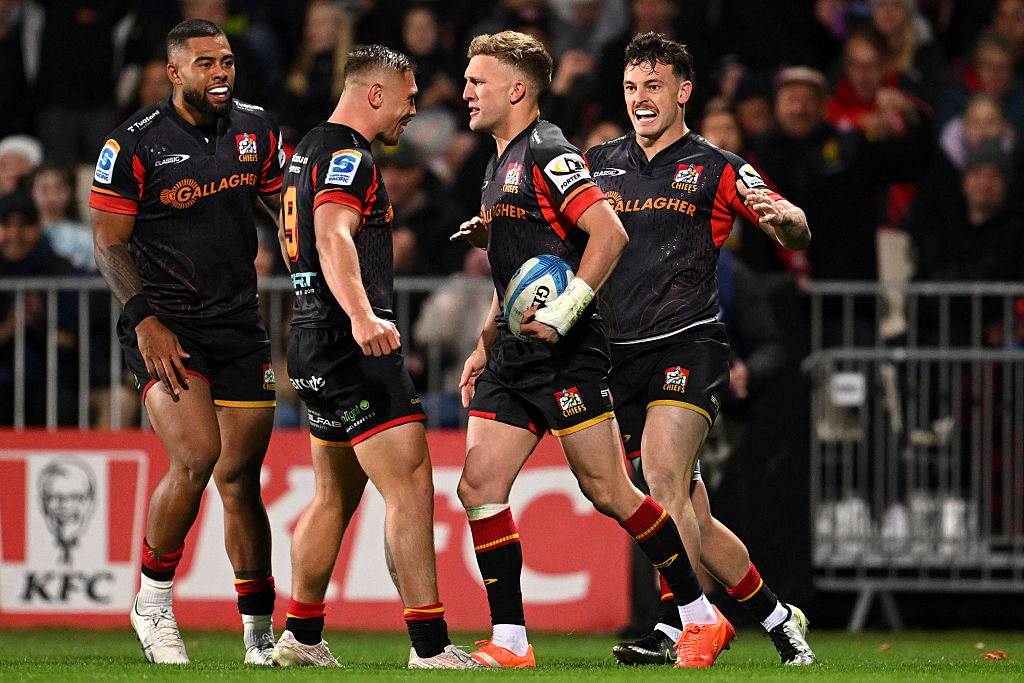
Super Rugby Pacific’s relevance in its first ever TEAM of the YEAR is that it is voted for by the coaches and captain’s of all 11 teams. And Australia’s rugby revival is emphasised in the Aussies having more players in the XV than New Zealand.
Moana Pasifika captain, the inspirational Ardi Savea, was an unanimous choice for PLAYER OF THE YEAR.
Savea collected enough points to be crowned PLAYER OF THE YEAR with two rounds still to play. His 46 points is the benchmark, with Chiefs (and All Blacks) flyhalf Damian McKenzie the next highest with 36 points.
Savea is the only player to exceed 40 points and just three players got more than 20 points on the voting from coaches and captains.
Savea has been magnificent in his first season with Moana, inspiring with performances on the field, and being equally big with his presence off the field.
Moana won six from 14 matches, with historic wins against the Crusaders in Christchurch and the Blues at Albany’s North Harbour Stadium.
While the Team of the Year will become an official annual award alongside Player of the Year from next season, this 2025 honorary lineup recognises the best players in each position based on Player of the Year votes throughout the campaign.
‘This is another opportunity to honour the most outstanding performers in our competition,’ said Super Rugby Pacific CEO Jack Mesley. ‘Importantly, it celebrates players across every position — recognising the respect and admiration they’ve earned from opponents week in, week out.’
A notable quirk: Carlo Tizzano, Fraser McReight, and Langi Gleeson all finished tied for the final back-row slot with 29 votes each. The tie-breaker compared the number of maximum ‘three-vote’ games, with Gleeson edged out. Remarkably, Tizzano and McReight were deadlocked even at the next level, so both were honoured in the final selection.
ALL THE LATEST NEWS FROM SUPER RUGBY PACIFIC
Australia has two teams in the final six, with the Brumbies finishing third and the Reds fifth.
Australia hosts the British and Irish Lions in the sport’s biggest event of the year. The tour will take in nine matches, including three Test matches and it was vital for the sport that the Australian teams performed competitively in Super Rugby Pacific. They did this – and more.
KEO: BE WARNED. SUPER RUGBY PACIFIC IS PROPER
To illustrate just how outstanding a season Timoci Tavatavanawai experienced, the Highlanders No 12 received the most votes (32) among No 12s and his team finished last in the league.
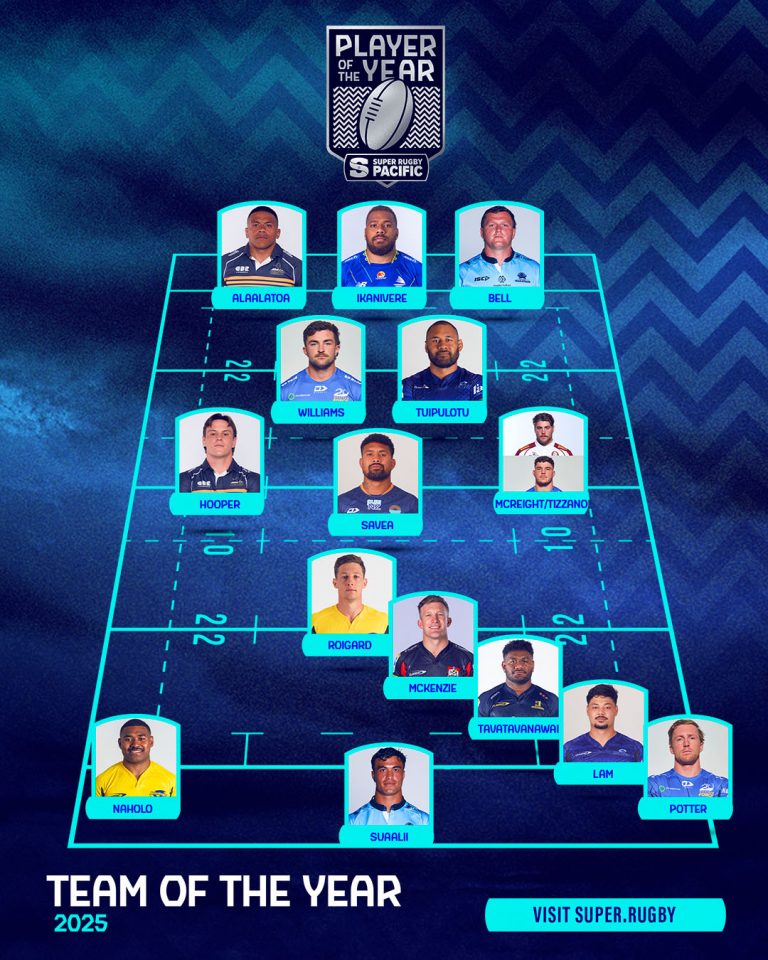
Here’s the 2025 Super Rugby Pacific Team of the Year:
Props:
Allan Alaalatoa (Brumbies, 20 votes)
Angus Bell (Waratahs, 14 votes)
Hooker:
Tevita Ikanivere (Fijian Drua, 19 votes)
Locks:
Jeremy Williams (Force, 21 votes)
Patrick Tuipulotu (Blues, 20 votes)
Back Row:
Ardie Savea (Moana Pasifika, 46 votes)
Tom Hooper (Brumbies, 31 votes)
Carlo Tizzano (Force, 29 votes) / Fraser McReight (Reds, 29 votes)
Scrumhalf:
Cam Roigard (Hurricanes, 28 votes)
Flyhalf:
Damian McKenzie (Chiefs, 36 votes)
Centres:
Timoci Tavatavanawai (Highlanders, 32 votes)
AJ Lam (Blues, 14 votes)
Wings:
Harry Potter (Force, 18 votes)
Kini Naholo (Hurricanes, 18 votes)
Fullback:
Joseph-Aukuso Suaalii (Waratahs, 20 votes)
Stay tuned to Keo.co.za for all the latest Super Rugby news and South African rugby insights!
KEO News Wire
Stormers, Bulls & Sharks ready for Vodacom URC quarter-final battles

All you need to know: The Stormers, Bulls, and Sharks head into massive Vodacom URC quarter-final battles this weekend, all hunting a semi-final spot and flying the flag for South Africa. Here’s your weekend preview: (more…)
Opinions
Elton’s light shines bright at the Lions
Lions captain Elton Jantjies has been the standout performer in the opening fortnight of Super Rugby Unlocked. His display against the Stormers at Newlands was brilliant.
Jantjies, who has played 37 Test matches, has often copped it for never quite replicating Super Rugby and domestic form at Test level, but with no Test rugby for the Springboks this year that debate gets put on hold until 2021.
World Cup-winning Springbok coach and National Director of Rugby Rassie Erasmus a fortnight ago was vocal that in Handre Pollard’s injury-enforced absence, Jantjies was the number one Springbok choice.
Youngsters Curwin Bosch and Damian Willemse are in the flyhalf queue, some way behind Jantjies, and to add depth to the South African flyhalf situation, Robert du Preez has shown promise for Sale Sharks and veteran Morne Steyn can always slot into a one-off Test situation.
But it is Jantjies who has shone brightest, despite the Lions narrowly losing in Durban and Cape Town.
I’ve been impressed with Jantjies’s leadership and he thrives on the captaincy. His all-round attacking game has no equal in the country, when it comes to flyhalves. His cross-kick attacking weapon is lethal, he takes the ball to the line and he is the most creative, if not necessarily the most direct, of the South African-based flyhalves.
I have always preferred Pollard to Jantjies as the Test starting option, but consistently Jantjies has been the form South African flyhalf in Super Rugby and when he has played in the Currie Cup.
People tend to remember the goalkicks Jantjies misses (and they aren’t many) instead of the many he has kicked in the most trying circumstances. He is one of the best goalkickers in the world, with a strike rate that is consistently in the high 70s and in several seasons he has averaged in the mid 80s.
Jantjies has matured incredibly in the past two seasons. He is also a player who is inspired by coaches who back him and entrust his talents.
Erasmus is one such coach and all his coaches at the Lions have looked to Jantjies as the general.
Allister Coetzee, in the season Jantjies was on loan to the Stormers, did not share the faith. In the 13 matches Jantjies played for the Stormers, he kicked just 11 points – and that was out of a possible 20 points. Jantjies’s crime was to miss two early penalties in his first match for the Stormers and he was rarely used as a kicker after this, despite having been one of the top points scorers for the Lions the season before, when his strike rate was 86%.
Jantjies can kick a ball, for the touchline and at posts. He has scored 1157 Super Rugby points for the Lions in 129 matches and 496 for the Golden Lions in 44 matches. He has also contributed 281 points for the Springboks in 37 matches.
He is playing with such confidence and such authority. He is leading a young team and he and Jaco Kriel are the senior statesmen of the Lions.
It is going to be a treat to watch him play all season in South Africa, just like it is going to be a treat to have all the current Springboks playing in South Africa’s domestic competition.
The Lions, despite falling short in two away games, have shown enough form to suggest they will be a top four contender.
The Cheetahs have started strongly with two wins, but I fear the absence, through injury, of veteran Ruan Pienaar for the next few months will put a dent in any play-off aspirations.
The Stormers were poor against the Lions but will get better with more games, the Bulls have been disappointing in both matches and the Sharks were fortunate to hang onto a win against the Lions.
After two weeks, no one team, has towered above the other, which tells you this competition is going to be a ripper and I expect every team to lose as much as they win when the top five plays each other.
Opinions
Sport in South Africa needs to return to stadiums
As appearing in “Keo’s Corner”, in The Cape Times and IOL Sport
Saturday, 26th September heralds the return to action for South Africa’s four Super Rugby franchises and from thereon it will be full-on until the domestic competition’s final match on 16th January, 2021.
There is unlikely to be much of a break for the players, with the need to start the 2021 season as soon as possible.
The 2021 rugby season in South Africa, with the arrival of the British & Irish Lions for an eight-match rugby extravaganza, will be the biggest sporting year in the country since the 2010 FIFA Soccer World Cup.
The Lions, made up of the best players from England, Ireland, Wales and Scotland, only tour South Africa every 12 years, and this will be the 14th time the Lions visit South Africa since the original 1891 (20 match) rugby marathon.
The key to any tournament success, and most notably an event like the British & Irish Lions, is fan support at the stadiums.
The South African sporting fans spoke with their wallets, as much as their hearts, when the official Ticket Ballot numbers were confirmed earlier in the week. In excess of 260 000 users visited the official South Africa Tour website and South African ticket applications totaled 323 964. This number doesn’t include the expected 30 000 travelling Lions supporters.
Sport codes, regardless of country, have in recent months largely resorted to matches and tournaments being played behind closed doors. This has provided broadcasters with matches, kept alive leagues, teams and the livelihoods of those who play sport or have careers linked to sport.
This can’t be a long-term solution because the strength of all professional sport is in a team or league’s ability to fill stadiums with supporters.
My sporting Christmas wish in South Africa is for matches to be played in front of a live stadium audience. The integration can be achieved, with a strategic approach that targets a youthful audience, who are least at risk in contracting the virus.
We’ve seen the success stories in New Zealand and in Australia, when it comes to spectators and Australia, especially, has been particular about this gradual increase of numbers at matches.
Spectators are screened, positioned in a way that ensures social distancing is maintained and all Covid safety protocols in mask-wearing and hand sanitation are non-negotiables.
New Zealand, for two months, had the luxury of no active Covid cases and during this time all sporting events were open to as many spectators as the stadium could take. Several of their local Super Rugby derbies were sold out events.
The Covid virus, considering the vast opinions of health experts, is not just going to disappear. We are all going to have to learn to live with it and navigate our way through it.
But the world simply can’t indefinitely stop and restart.
South Africa’s active case numbers, according to official statistics, are the lowest they’ve been since the numbers spiked three months ago.
I accept there will be an initial conservative approach to sporting events, but there has to be intent that matches be played in front of spectators. In a stadium with a 50 000 capacity, being able to seat 10 000 and conform to every safety regulation around Covid, can be achieved.
The integrated lifting of the international travel ban is an injection into tourism and the economy, but closer to home, the sporting stadium attendance waters have to be tested sooner rather than later.
Rugby in South Africa is back on Saturday. For that I am grateful, but rugby (and all sport) is this country will only feel like it is back when those of us who love our sport, are close enough to the action to smell the grass, feel the collisions and create the type of stadium atmosphere that turns a match into an occasion.
Opinions
South African Rugby’s exciting return
I sat down with the MoneyMan to chat about the return of South African domestic rugby and the Green v Gold trial match to be played at Newlands in the final Bok clash ever at the Grand Old Lady of South African rugby.
Opinions
Pollard is deserved of the top salary in world rugby
Mark Keohane, writing for IOL Sport
Handre Pollard is the highest paid player in world rugby – and rightly so.
Pollard is a player who sparkled as a teenager and because of his youthful brilliance, his senior achievements have always seemed underwhelming because they have been so expected.
Former Springbok coach Heyneke Meyer identified Pollard as a World Cup-winning flyhalf when he first saw him play as a 15 year-old for Western Province’s under 16s, and Meyer was the inspiration to Pollard’s selection for the baby Springboks who won the 2012 under 20 World Championship.
Pollard was still in matric at Paarl Gymnasium and Meyer encouraged baby Springboks coach Dawie Theron to break with tradition and select Pollard. No schools’ player had ever been picked and, post Pollard’s selection, no schoolboy has ever been picked again.
Pollard would excel in the final at Newlands, Cape Town and be decisive with the boot as South Africa beat New Zealand to take the title.
It was the start of things to come for a young man, who would captain Western Province Schools, South African Schools, South African under 20s and be confirmed as the best under 21 player in the world in 2014. He would also make his Springbok Test debut at 21 years-old against Scotland and a few months later destroy the All Blacks at Ellis Park, Johannesburg with two tries and 19 points in a 62-minute dazzling display.
Pollard, at 21 years-old, would kick five pressure penalties in the 2015 World Cup semi-final against the All Blacks at Twickenham, but come second to a masterclass from All Blacks veteran Dan Carter.
Rugby had always come easy to Pollard, whose father Andre had captained Paarl Gymnasium in 1978. Rugby was in his DNA and physically Pollard was an imposing presence in a No 10 jersey. He stood at 6ft2 and weighed 100 kilograms. His athleticism complemented a natural physical presence and one of his strengths was an ability to play close to the gain line, to take the ball into the tackle and to make tackles.
Meyer, pre the 2019 World Cup, described Pollard as the best defensive flyhalf in the game and a player who in time could match New Zealand’s Carter in international achievement.
Carter, Meyer would often tell me, had no comparison among Test flyhalves. Meyer rated Carter the complete package and felt that Pollard could similarly evolve and become the most sought-after signature in the game.
Pollard hasn’t disappointed his former coach, who predicted the Springboks would win the 2019 World Cup if a fit and conditioned Pollard was wearing 10.
Pollard did wear 10 in Japan and his pressure penalty with 10 minutes to go in the semi-final emphasized his temperament to deliver when it mattered most. Wales had fought back to 16-all and had the momentum. Penalty: South Africa, and it was a kick that had to go over if the Springboks were to arrest the Welsh momentum. Pollard, as acute as the angle was, nailed it.
His 22-point performance in the final was Carter-like in how he dictated play. His forwards beat up England and, with front foot ball, Pollard kept the Springboks on the front foot all evening.
Few realized he had played the final quarter with a fractured eye socket. It typified his resolve and his ruggedness. He didn’t shirk responsibility and he certainly didn’t hold back in the tackle.
Montpellier had struck gold in getting Pollard to leave the Bulls.
Pollard, financially, had also played a winning lotto ticket against England in the 2019 World Cup final.
Yet it could all have been so different because of a shoulder injury, a knee ligament tear and a shoulder operation that went horribly wrong.
Pollard, in 2016 and 2017, spent more time in hospital than he did on a rugby field and at one stage feared his arm would be amputated because of an infection post a shoulder operation.
‘It was touch and go,’ said Pollard when describing his nightmare and fears to the media.
He said the potential loss of his arm and the realization of how his career could be ended so abruptly gave him the life perspective that may have been lacking in a young man, whose rugby life had always had the midas touch.
The 2019 World Cup-winning coach Rassie Erasmus, early in his Springbok coaching tenure in 2018, told me that he never doubted Pollard’s pedigree but he initially questioned the player’s desire to be the best player in the world.
Erasmus challenged the player on his philosophy and attitude towards rugby. The coach wanted to know if Pollard played the game because he found it so easy or if he played the game because he loved the game.
Pollard would answer those questions on the field, with consistency and impact. He played the game because he loved it, but he also was of that rare elite breed that found it particularly easy.
The great flyhalf generals control the pace of the game and dictate tempo. Pollard is among those great flyhalves.
The two-year absence from rugby in 2016 and 2017 damaged Pollard’s confidence. By his own admission, it was the first time in his life that he questioned if his body could do what his mind always computed.
The only way back was the hard way through consistent game time. His mind, always strong, was even stronger because of his off-field triumph to get back on a rugby field. His body, when just 23 years-old, had the battle scars of one 10 years older.
Pollard persisted with playing every possible match in 2018, and while initially inconsistent, the mediocrity would turn to magic. According to SA Rugby Magazine, he played 1157 minutes from a possible 1280 for the Bulls in Super Rugby and 997 from 1200 minutes for the Springboks and Barbarians.
His knee, his shoulder and his body, started 2019 as strong as his mind. Pollard, at 25, was once again ready to conquer the world.
‘I picked him in 2015 because I felt we could win the World Cup with him at No 10. It didn’t matter that he was just 21. He was always good enough,’ said Meyer.
But if Meyer took a boy to rugby’s biggest bullfight in 2015, Erasmus took a man to the same fight four years later – a man that when the tournament was over was the most valued player in the world
WATCH: HIGHLIGHTS OF POLLARD’S CAREER THUS FAR
Opinions
Appreciate Elton Jantjies
Appreciate Elton Jantjies. Celebrate him and acknowledge his contribution to South African rugby. He is the most influential South African Super Rugby flyhalf in the past 10 years.
Super Rugby’s SANZAAR earlier this week named a South African Super Rugby XV of the decade. The only criterion was Opta statistics, which were weighted in terms of attacking play. Jantjies was considered the best in South African since 2011.
Jantjies, since his Super Rugby debut in 2011 and his Test debut in 2012, has been a divisive figure among South African rugby supporters. He polarizes the rugby public in a very similar way Springbok Test centurion Percy Montgomery did throughout his professional career.
Montgomery’s greatest impact would come in the Test arena, where he kicked the Springboks to the 2007 World Cup title. He was also the first Springboks to play 100 Tests.
Jantjies’s impact at Super Rugby level has been consistent with what Montgomery did at Test level, but because Jantjies has never converted his imposing Super Rugby returns to the Test environment, there is a common view among many South African rugby supporters that Jantjies’s career is one of failure.
You won’t get many who would pick Jantjies ahead of 2019 World Cup winner Handre Pollard, whose Test form often has been better than his Super Rugby performances.
Jantjies’s style of play is similar to New Zealand’s Carlos Spencer, who was a flyhalf revered for what he did for the Blues in Super Rugby but ridiculed for what he consistently didn’t do for the All Blacks.
Spencer had his moments in the All Blacks No 10 jersey. I was at Ellis Park in 1997 when he kicked the biggest of pressure penalties to beat the Springboks, while regular first choice flyhalf Andrew Mehrtens was warming the sideline. Spencer also bamboozled the Springboks in the 2003 Rugby World Cup quarter-final. His Test highlights were few and it is his five missed penalties against the Boks in Wellington in 1998 that is more synonymous with Spencer, the Test player.
It doesn’t negate the brilliance of Spencer, the Super Rugby player.
Equally, what Jantjies has achieved for the Lions in Super Rugby should not be dismissed because of what he is perceived not to have achieved with the Boks.
Jantjies found a home at the Lions with coaches Johan Ackermann and Swys de Bruin. The latter, in particular, believed in Jantjies as a playmaker, a goalkicker and a leader. De Bruin was relentless in his praise for Jantjies where others were rampant in their condemnation of the player.
In contrast Stormers and former Springbok coach Allister Coetzee couldn’t find a connection with Jantjies. Coetzee, in the season that the Lions did not play Super Rugby, drafted Jantjies to the Stormers, but never entrusted him with being the general.
Jantjies, whose goalkicking strike rate as a professional is 76 percent, missed two early penalty kicks in his Stormers debut and was relieved of his goalkicking responsibilities. Jantjies, who has scored 1134 points in 127 matches for the Lions, in 13 matches for the Stormers scored just 11 points from a possible 20. In the end of his one season at Newlands, he wasn’t even doing the line kicking.
It took him one match back at Ellis Park to flourish again. The Lions style of play suited Jantjies and Super Rugby’s more flamboyant attack environment catered for all the strengths in Jantjies’s rugby make-up.
Sanzaar’s Opta statistics detailed Jantjies’s Super Rugby return of 1145 points (the second most scored by any player in the last 10 years), his 59 try-assists (the third most), his 50 clean breaks (the most among South African flyhalves) and his 2902 metres in gain, be it from the boot or with ball in hand, as the summary of his South African Super Rugby No 10 of the decade selection.
‘What about his missed tackles, his lack of defence and his vulnerability under pressure,’ screamed his detractors on social media.
Jantjies does miss tackles, in Super Rugby and at Test level, and he has buckled in big pressure moments in Test rugby, but this was not an award relevant to Test rugby. This was and is about Super Rugby, which is so different to Test rugby.
To borrow from cricket, don’t dismiss the credentials of South Africa’s most successful T20 batsman because he didn’t have the technique to succeed as a Test batsman.
Jantjies’s flaws have been exposed too many times at Test level, but his strengths have always been emphasized through his play in Super Rugby.
Super Rugby works for Jantjies and the player has made it work for himself and the Lions.
Give him his due because over and above all the attacking statistics there isn’t a South African No 10 who has rocked as much as Jantjies has in the last 10 years.
A player doesn’t have to have done it exclusively in a Springbok jersey to be revered for his rugby playing ability. Jantjies is among that group of players, with others including Schalk Brits, Neil de Kock, Ruan Pienaar and Ricky Januarie.
Go to Saracens and ask any supporters and UK media about the quality of Brits and De Kock. Equally, Pienaar at Ulster or Januarie in France’s Top 14.
Brits played 216 matches for Saracens between 2009 and 2018 and won two European Championship titles and four Premiership titles. De Kock played 250 matches for Saracens after having played 101 Super Rugby and Currie Cup matches for the Stormers and Western Province respectively. Yet both combined for less than 30 Springbok Tests over a decade.
Januarie is one of the most inspiring South African rugby stories and not just for his individual magic in scoring the match-winning try to beat the All Blacks in Dunedin in 2008. That moment is part of Bok rugby folklore, but Januarie’s story is even more impressive.
He played 47 times of the Boks in the era of Pienaar and the incomparable Fourie du Preez and on his international retirement subsequently found greater fame and fortune in playing 162 matches for Lyon (79), La Rochelle (43) and Agen (40) in France’s Top 14. Januarie has been in France since 2011 and at 38 years-old is still mixing it with the best. What a story. What a South African rugby legend.
Jantjies is just 29 years-old and don’t bet against his next five years being everything as good as it has been for the last 10 years. Just don’t expect it to be at Test level, when his brilliance has always been as South Africa’s best Super Rugby No 10.
WATCH: JANTJIES IN ACTION
Opinions
Gatland’s powers of rejuvenation
Mark Keohane, writing for IOL Sport:
Warren Gatland has had an immediate impact on his return to New Zealand rugby. His Chiefs are winning more than they are losing and Gatland has found an X-factor in Lachlan Boshier that was not quite as obvious in the past few years.
The 25 year-old Boshier has been in the Chiefs system since 2016 and has played 50 Super Rugby matches, but he made more of an impact in the first four rounds of this year’s competition than he did in the past four years.
Boshier, modest and unassuming, is the opposite in the way he attacks the breakdown, and his style of play has blossomed because of Gatland’s game strategy and emphasis on pressure defence.
Gatland, as he did when coaching Wasps and Wales, has the ability to turn good players into super players; individuals blessed with strong basic skills who prosper because of Gatland’s appetite for simplicity in how the game is played.
Boshier, 1.94 metres, is blossoming in the specialist No 7 jersey role of openside flanker. He has also formed a potent combination with All Blacks loose-forward Sam Cane, who is among the favourites to captain the All Blacks under Ian Foster.
Boshier has had no equal in the competition this season in winning turnovers. He is averaging five turnovers a match, with the next best player averaging two. His tackle count is also in the top five in the competition.
The All Blacks have struggled to find a settled loose-forward combination since legendary captain Richie McCaw retired and veteran blindside Jerome Kaino opted to finish his career with French club Toulouse.
The All Blacks have used several players in the McCaw role, with Cane viewed as the natural successor, but Boshier’s impact has allowed Cane to settle as blindside flanker, with a feature of his game being his strong ball-carrying into contact.
Boshier played for New Zealand Schools in 2012 and for New Zealand under 20s in 2014, but in his first four years of Super Rugby was never mentioned as a possible All Blacks loose-forward. Now his name is top of the list in traditional and social media discussions when it comes to All Blacks selection.
Gatland, who will lead the British & Irish Lions in South Africa in 2021 and return to New Zealand rugby for the 2022 season, has also rejuvenated Aaron Cruden’s career.
Cruden, who won a World Cup medal with the All Blacks in 2011, moved off-shore to French Top 14 side Montpellier a few seasons ago. He battled with injury and never settled in Montpellier.
Gatland quickly has got the best out of Cruden, who in the past month, produced the form that made him a regular with the All Blacks inbetween the 2011 and 2015 World Cups.
Gatland has also settled on Damian McKenzie as a fullback, ending former All Blacks coach Steve Hansen’s experiment of McKenzie at flyhalf.
Fast fact: Boshier’s younger brother Kaylum captained New Zealand at the under 19 Cricket World Cup in 2018 and he is currently in the Chiefs under 20 squad.
Opinions
Sharks Rugby a beautiful spectacle says Keo
Writing for IOL Sport, Mark Keohane says that the Sharks have been a joy to behold this season.
I don’t live in KwaZulu-Natal and am very much an outsider to rugby in the region, but the Sharks have been my favourite team to watch in this year’s Super Rugby.
They have played with freedom, with a smile, with intent and with success.
They represent the future of South African rugby, in results and in representation when it comes to transformation.
My knowledge of Sharks coach Sean Everitt was limited but the new Sharks coach has quickly confirmed his status as a leader among South Africa, and the tournament’s, new coaches.
Everitt has impressed with his selections, with his frankness when discussing his selections, his players’ strengths and also his philosophy on the game.
Pre-season, Everitt confirmed that Curwin Bosch would be his starting No 10. He would not alternate Bosch between fullback and flyhalf, as had happened the year previously under coaching predecessor Robert du Preez.
Bosch suffered in selection, with Du Preez insistent in backing his son Robert jr as his premier flyhalf. Bosch’s form suffered, even though Du Preez experienced a horror season.
Everitt was quick to act on investing in Bosch, who had entertained a move to the Stormers in the off-season.
Everitt went on record to espouse the strengths of Bosch and said that the only way the player would flourish was if he was given the opportunity to play regularly in his favoured position.
The coach has been true to his word and Bosch has delivered.
Everitt also scouted wisely in the signing of Sikhumbuzo Notshe from the Stormers. He also made a call that the loose-forward would specialise as a No 8 and not be played in multiple roles, as had been the case in the Western Cape.
Notshe has been the star forward of the Sharks and one of the most influential forwards in the competition.
Ditto the signing from the Cheetahs of prop Ox Nche.
Another masterstroke was the appointment of Springboks World Cup-winning midfielder Lukhanyo Am as Sharks captain.
A year ago, I asked South African Director of Rugby Rassie Erasmus about Am. His response was that Am was the first name in his starting Springbok backline. Erasmus said Am did so much in terms of leadership and organising defences that wasn’t always obvious to the supporter.
Everitt obviously agrees with Erasmus when it comes to Am and the results have vindicated this faith in the centre.
The selection of fullback Aphelele Fassi is another that has brought cheer to every rugby romantic.
Fassi plays the game with explosiveness and his attack has so much style.
He scores tries, makes tries, and is one of the hottest talents in the competition. He is also just 22 years old.
Everyone I speak to tells me the Sharks this season are either their favourite team or second favourite team, and they all agree that the Sharks are the team who have proven the easiest on the eye.
The Sharks also finally have a leadership that is more revolutionary than reactionary in chief executive Eduard Coetzee, who played for the Sharks before enjoying eight years in the French Top 14.
Coetzee has dedicated his leadership to making the Sharks the most transformed and commercially successful team, to complement an on-field success.
Diversity is the team’s recipe for success and it is inspiring to hear a CEO proudly proclaim that in his franchise, everyone sees colour and celebrates colour because they celebrate diversity and drive inclusivity.
Opinions
Super Rugby 2020 must take preference over Boks’ July internationals
Mark Keohane, writing for IOL, says that Super Rugby’s 2020 season must take preference to the Springboks’ July internationals.
National takes priority every four years in world rugby. South African rugby is no different to any other nation in a World Cup year. Concessions are made and everything national takes precedence to ensure the Springboks are primed for the World Cup.
Global rugby calendars adjust their season to accommodate the World Cup. In the southern hemisphere, World Cup squad members have limited time in Super Rugby and the Rugby Championship’s fixtures are halved.
Now is the time for national to take a back seat and in 2020 willingly accept the needs of national are secondary to those Super Rugby franchise requirements.
The Coronavirus is uncharted territory for everyone on this planet. Businesses, sports, entertainment, governments … you name it … everyone is scrambling for a solution to a situation that has never before been encountered.
The world is currently in lockdown and sport, within the world’s day to day operation, is similarly in lockdown.
SuperRugby bosses are working every possible solution to save the 2020 season. They are working with the unknown of just how long the Coronavirus will keep people at a distance and limit any formalized sporting, cultural or public events. They are working in the hope that by May there is clarity and that by June the sporting season can resume.
Should this be the case, then the Springboks’ three-Test July obligation against Scotland (twice) and Georgia must be canned to reintroduce Super Rugby, even if it is a shortened version of the original 2020 schedule.
The Rugby Championship, scheduled for August and September, can also be limited to one round of fixtures, as was the case in 2019’s World Cup year. All other rugby competitions in the southern hemisphere, must be sacrificed to ensure Super Rugby gets a fair crack at completion in 2020.
This is all assuming that sport is at some stage allowed again in 2020.
SuperRugby is the financial lifeline to rugby in the southern hemisphere. The core of the players earn their living through SuperRugby and not through international Test rugby.
New Zealand’s rugby bosses are exploring the option of a New Zealand domestic Super Rugby franchise competition over the next few months, which would determine an on-field New Zealand champion. Australia are doing a similar thing and by all accounts, so will South Africa.
This format limits international travelling.
Super Rugby’s current play-off structure ensures one representative from New Zealand, Australia and South Africa as the top three teams by way of being conference winners. Places four to eight then play-off in a quarter-final.
I’d propose New Zealand, South Africa and Australia’s domestic champion and last season’s beaten finalists, the Jaguares (from Argentina) get a wild card entry into a semi-final.
If international travel has been resumed, then the Jaguares travel away from home and play the team that has the most league points. Teams two and three play out the other semi-final.
I’d much prefer the idea of the Crusaders play the Sharks in a semi-final in July than watching the Springboks play Georgia. If there is to be rugby life after the Coronavirus, then in the southern hemisphere it has to be Super Rugby before any Test rugby.
KeoBET
MoneyMan Show: Coronavirus halts surging Sharks
KeoBET
MoneyMan, Mark and James chat Super Rugby Round 7
Opinions
Springbok-style Sharks have the edge over Stormers says Dalton
The Sharks passed their proverbial acid test in hammering the Jaguares in Durban, and they will now host South Africa’s other top side, the Stormers, in what will be a defining match for the two sides, writes former Bok hooker James Dalton for SA Rugby Magazine
The Stormers come off the back of a bye and a horrible loss to the Blues at home. The Sharks, conversely, will be high on confidence after bringing the success of their tour to home turf and picking apart the Jaguares.
As I’ve said many times this year, I’m really enjoying the way the Sharks play. They seem be the South African side best implementing the Rassie Erasmus/Springbok style of play – they attack space, stretch defences, and their territory kicking has been brilliant, as has the regain rate of their kicks, and when they kick high it’s effective.
The Stormers, to me, have been a lot more one-dimensional in their approach, relying on scrum, ruck and lineout dominance. When they didn’t find these against the Blues, their defensive system – which everyone had been praising – looked lost for answers and the Blues attacked space with pockets of players, leaving the Stormers looking sluggish.
The Stormers can’t afford to make the same kind of mistakes against a lethal Sharks side. If they are to be competitive, they need to be a lot more tactical. They need to slow the game up, to combat the Sharks’ quick-fire, high-pressure approach, and try to choke them out a bit.
They also need to kick for lineouts, where they do have the advantage over the Sharks, rather than kicking straight down their throat, as the Sharks have a brilliant counter-attack, and the Stormers don’t have the defensive structure built to absorb a counter defence or attack from broken play.
Essentially, the Stormers need to bring the game down to their pace if they are to have a fighting chance against the Sharks. They must also try to make the most of the high penalty count that the Sharks often suffer as, while Damian Willemse has been inconsistent from the tee, it appears that Jean-Luc du Plessis may add some stability there. Where the Sharks did appear vulnerable, too, was in the last 20 minutes against the Jaguares, where they leaked some points and began to look a bit careless and unstructured.
The Stormers will no doubt be cognisant of this, and while the Sharks do have the edge, they need an 80-minute performance to emerge successful, not just a brilliant 60 minutes. It will be an interesting battle, too, of the packs, with the young Sharks pack being questioned constantly but then fronting week after week. The Stormers boast one off the strongest packs in the tournament and will be looking to restore faith after a poor showing against the Blues.
The Stormers will undoubtedly be looking to shake off the Blues loss and bye week, but at the end of the day, I think the Sharks are too high on confidence and too good. At home in the Shark Tank, they’ll edge their conference counterparts.
Opinions
Lukhanyo Am’s unmatched eye for the game
Lukhanyo Am as has slowly solidified his place as South Africa’s best outside centre, and in 2020 is making a claim for one of the best outside centres in World Rugby.
Am has proven to have an eye unlike any other centre, at least in the South African Super Rugby conference. While his impact was a lot more subtle towards the start of his career, having played for a brilliant World Cup winning Springbok side last year, and currently leading the table topping Sharks, his presence is becoming more and more evident. He is thriving off the quality of player around him, while simultaneously seeming to improve the quality of those players.
Captaining the Sharks, his commanding of the defensive system this season is unmatched, organizing a high pressure, high conversion rush defence approach, but also communicating effectively with his wings, as is evident by their ability to both push and spread on defence. Aside from his communication and organization, Am has been successful in 29 of his 32 tackle attempts so far this season, leaving him with a 91% tackle success rate after 6 rounds of Super Rugby and has also forced 3 turnovers.
He has shown too, an exceptional eye for the intercept, which has been integral in the Sharks ability to turn the flow of play and on attack has been consistent in linking well and creating opportunities as he’s directly assisted in four of the Sharks tries and has scored one himself. He’s also racked up 177 running meters in his 19 runs and beaten seven defenders.
While Am’s presence extends beyond statistics in terms of the authority he brings to the defensive and attacking structures of his side, the statistics also tell a story of an incredibly well rounded performer. He has been equally effective in all the measurable areas of his game, yet the performance of the players around him speak to his immeasurable effect. Lukhanyo Am came into his own in helping the Springboks to World Cup glory, and has ridden that wave of form into the 2020 season. It’s exciting to see what he will be able to do when he fills the number 13 jersey for the Springboks again this year.

